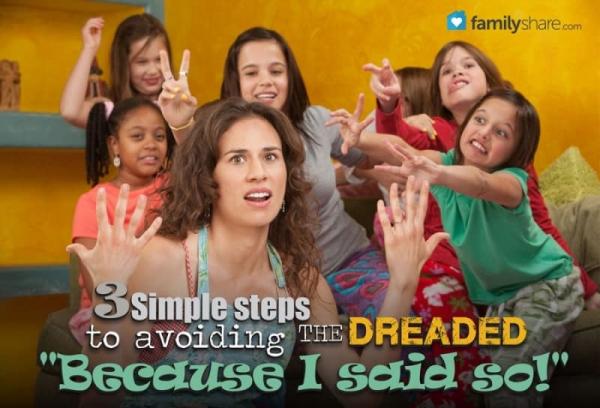
"Mom, can I have more ice cream?"�
"No, honey. You've had enough already."�
"But Mom - why not? Why can't I, Mom? Please, Mom?!
"No. You've had enough, and that's final."�
"But Mommm ... just one more scoop, Mom? Pleeaasse?! Why not, Mom?"�
"Because I said so, that's why!"�
We've all heard it. We've probably even used it. And I'm willing to bet that quite a few of us have even been on the receiving end of it. But how many of us have actually taken the time to reflect on the message behind words that have potentially shut down communication within families for generations? Many parents, myself included, have at one time or another translated "Honor thy father and thy mother"� to mean "Because I'm the mom/dad ... that's why!"� and used it as their default behavior modification tool. While not all of us may know exactly where in The Good Book this verse is nestled, I have no doubt we all know the exact page, paragraph and line in The Parents' Guide to Get Our Way handbook in which those six words live. But if the essence of the commandment of honoring thy father and thy mother isn't to be used as a blanket authority to get instant peace and quiet, then what does it really mean, and what good is it anyway?
According to Webster's dictionary, honor is defined as "showing a courteous regard for"� someone or something. Perfect, right? After all, who wouldn't like to have a few more servings of courteous regard from their kids on a regular basis? With that kind of interaction between our family members, we'd have a lot less whining and a whole lot more respect, cooperation and quite possibly even laughter. Who knows? The incessant sound of video games humming in the background might begin to give way to conversations filled with talk of family fun, hopes and dreams.
Exactly how do we go about making this concept of honor a reality when it comes to how our children interact with us and their peers? Just because we understand it and preach about how much we want, deserve and need it doesn't mean the courteous regard - or any regard for that matter - will start happening the second we clue our kids in on how it works. I don't know about you, but when I would hear about a new way of getting my kids to respect me, I would tirelessly wave my magic wand in hopes of seeing instant change, and get nothing out of it but carpal tunnel flare-ups. My kids got frustrated my massage guy got paid, and I got nothing but the same results.
It wasn't until I started using these three simple steps that I was able to drop the wand, save a few bucks on massages, and teach my family by example the true meaning of honor and courteous regard.
1.
Give what you hope to get
. Kids are God's ultimate sponges. They absorb everything they see and hear, whether we think they're watching and listening or not. Take a minute to "check yourself before you wreck yourself,"� and see how you're treating the folks in your immediate circle. What examples of honor are you setting for your kids? Do they hear you mumbling under your breath about how their dad put dirty dishes in the dishwasher when the ones in there were already clean? How about the time you blamed their mom for your being late to work because your breakfast was a few minutes late getting to the table? Just because they're caught up in texting with their friends or on the computer and don't seem to be clued in to what's going on around them, our kids know what's up. Speaking our truth in love and with respect is the greatest way to honor not only others but ourselves, as well. When we can lovingly let people know our needs - and even our wants - we're setting the stage for courteous regard to be what drips out of us AND our little sponges every time we're squeezed.
2. Stop look and listen
The next time you feel yourself being squeezed by your kids (and you will.) Instead of grabbing for your default "because I said so"� axe, reach for your shiny new communication tool. Take a grown-up time out and think about what your needs are in that situation, and let your kids know. Look at things from your child's perspective by giving him or her a chance to express their needs, as well. Once everyone has had a chance to see things from the other person's point of view a space has been created for everyone's needs to be met with love, respect and honor.
3.
Repeat as necessary
As much as we'd all LOVE for these steps to take hold after the very first try, we all know that the only way to get to Carnegie Hall is to practice, practice, practice. We've had years of opportunities to create the habits we fall back on every day. Great news: Life is full of do-overs. Every person breathing was created to love and be loved, respect and be respected - kids included. So allow yourself to be vulnerable enough to let your kids know that you're trying something new, that you're going to need some practice (and so are they), and that you're going to be teaching them by example. Be OK with letting them know if you accidentally grab the wrong tool out of habit, and ask them for a do-over. As long as you keep speaking your truth in love and with respect to them, the return on your investment will far outweigh the practice and the elusive honoring of thy father and thy mother will be your family's standard operating procedure for generations to come.

